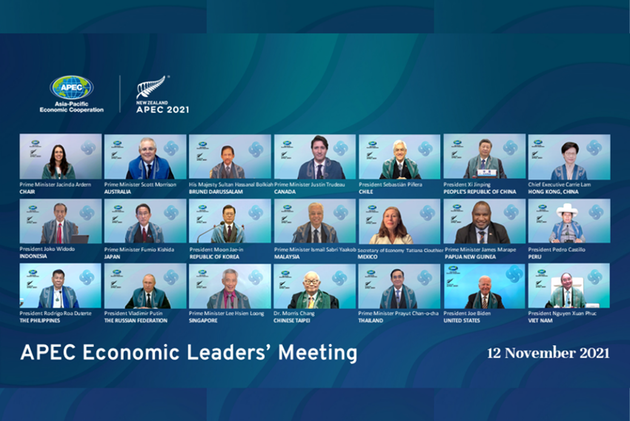Leaders of the 21 Apec member economies concluded their annual meeting on Friday with a declaration highlighting policy actions designed to respond to Covid-19, New Straits Times reports.
The declaration lays out commitments in accelerating economic recovery and achieving sustainable and inclusive growth. This includes further actions in tackling climate change, empowering groups with untapped economic potential, supporting the region's micro, small and medium enterprises and addressing the digital divide. The leaders also endorsed the Aotearoa Plan of Action, a blueprint to implement the Apec Putrajaya Vision 2040, which was adopted at the 2020 Apec Economic Leaders' Meeting.
The Aotearoa Plan will be key to implementing the Putrajaya Vision in the next 20 years. "This will inject new momentum into Apec, at a time when our region faces significant challenges. It demonstrates the confidence we have in sharing our individual approaches, working together collectively where we can, and being willing and open to ideas addressing new challenges," the leaders said.
They said the evolving nature of the Covid-19 pandemic and its variants will create ongoing uncertainty and an uneven economic recovery across the Asia Pacific region. "Responding to this deepest of challenges has been a top priority in 2021. In this regard, we are taking steps to ensure growth rebounds quickly and to boost the global economic recovery," the leaders said in the declaration.
Apec economies have reaffirmed their commitment to join together and respond to the immediate crisis generated by the pandemic through urgent work. They will strengthen cooperation so that the region can return to growth in a way that is more innovative, inclusive and sustainable.
In July, Apec economies had met to discuss their response to the pandemic. "We recognised the inequities in widespread access to Covid-19 vaccines, and therefore, we continue to strongly support equitable access to safe, effective, quality-assured and affordable Covid-19 vaccines, diagnostics, therapeutics, and other related essential medical products."
As a result of restrictions on the cross-border movement of people due to the pandemic, unrealised economic activity losses have been substantial. "As we each look at reopening without undermining efforts to prevent the spread of Covid-19, we support Apec playing a greater role in promoting information exchange and coordination measures related to cross-border movement of people, including in relation to air and maritime crew, and Covid-19 testing and vaccination certificates," the leaders said.
While an immediate response to the health challenges posed by the crisis remains essential, the member economies are also now cooperating on policy responses to the significant economic, social and environmental challenges in coming years.
The leaders welcomed the work of Apec finance ministers and in particular, the new strategy for the implementation of the Cebu Action Plan to achieve its goal of a more financially integrated, transparent, resilient, and connected Apec.
The leaders also welcomed the historic agreement on a more stable and fairer international tax architecture reached in October. "We strongly reaffirm our commitment to promoting tax certainty and tackling tax avoidance and evasion in the Apec region." The leaders said the pandemic has highlighted how structural reform of services sectors can be a powerful enabler of economic growth and inclusion. "We note the uneven progress in increasing services competitiveness in the region and in delivering a more open and predictable environment for access to services markets. "We commit to accelerate work in response to the mid-term review with the aim of fully implementing the ApecServices Competitiveness Roadmap by 2025," they added.
Thailand will next host Apec 2022.






